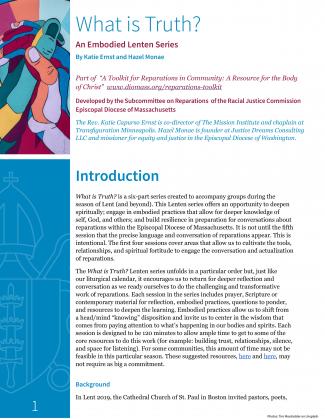"What is Truth?" It's a question that the diocesan Racial Justice Commission's Subcommittee on Reparations invites congregations, groups and individuals to grapple with--and grapple with yet again--with the help of the "What is Truth?" study series it commissioned and launched last Lent.
The upcoming Lenten season offers a new opportunity to engage with the six-session series, which is still available for use at any time as part of the Reparations Toolkit, all online at www.diomass.org/reparations-toolkit.
The Rev. Chris Wendell, the rector of St. Paul's Church in Bedford and new co-chair, with Constance Perry of Trinity Church in Boston, of the Subcommittee on Reparations, said the series was a good way for participants at his congregation to extend conversation and learning already underway there.
"We were looking for a way to build on the challenging and life-giving conversations of the Sacred Ground curriculum, and enter into more extended reflection on the topic of reparations. What is Truth? provided gracious room for introspection alongside dialogue, lament alongside transformation, embodiment alongside intellect, which invited us to bring our whole selves into the group—body, mind and spirit. We are each continuing to unpack the wisdom that is emerging from our shared experience months later," Wendell said.
At launch last year, subcommittee member Leonie Drummond of the Church of the Holy Spirit in Mattapan, described the series as “an opportunity for a communal and embodied experience, encouraging participants to go past thinking about the concept of truth to really experiencing the practice of truth-telling, however uncomfortable that may seem, and to examine how that feels 'in their bones,' In feedback provided to the subcommittee, Claudette Gates, also from Church of the Holy Spirit, said of her experience with the study, "There was deep reflection, which caused varying emotions to emerge, but we practiced listening and sharing with each other."
The series' six sessions are two hours each, with materials designed to facilitate a collective community process without the need for an instructor or leader’s guide—part of the richness and the challenge of the series, according to subcommittee leaders.
"'What is Truth?' has been found to be a useful resource for individuals and congregations to engage in conversations and deepen relationships, regardless of where they are on the journey of exploration of what is truth," subcommittee co-chair Constance Perry said of the series. "It paves the way for deeper reflection and conversation as congregations tackle the more challenging and transformative work as together we create the Beloved Community."

